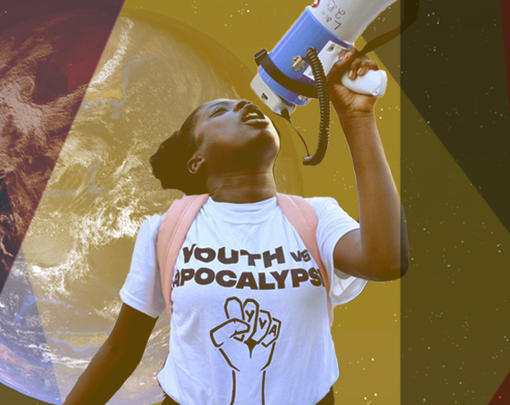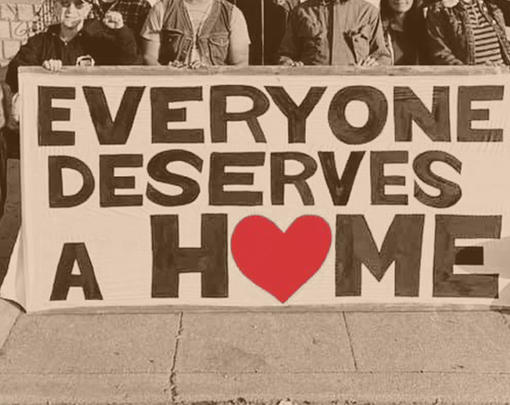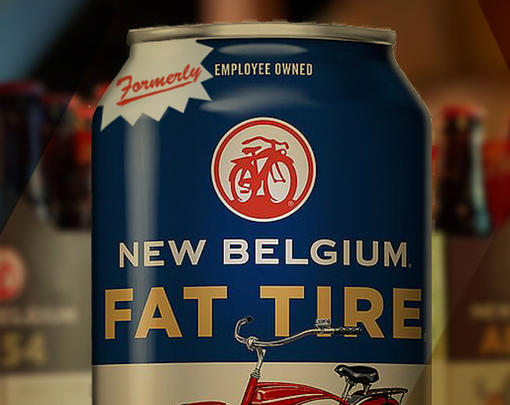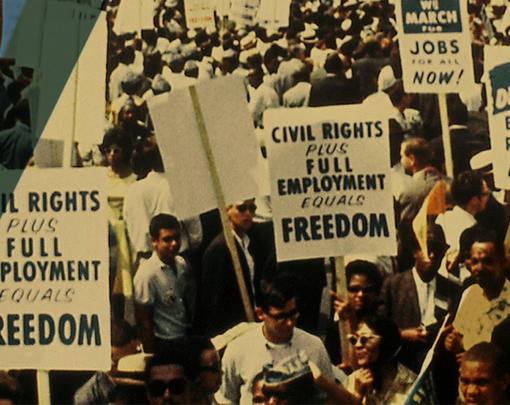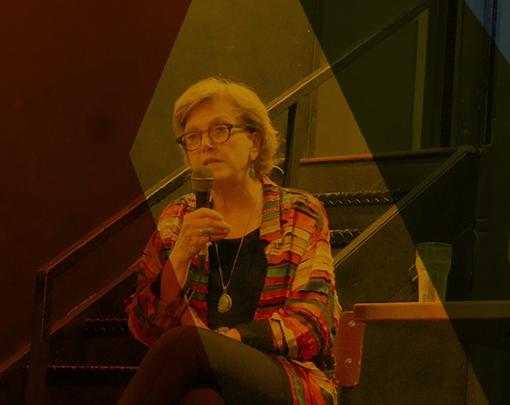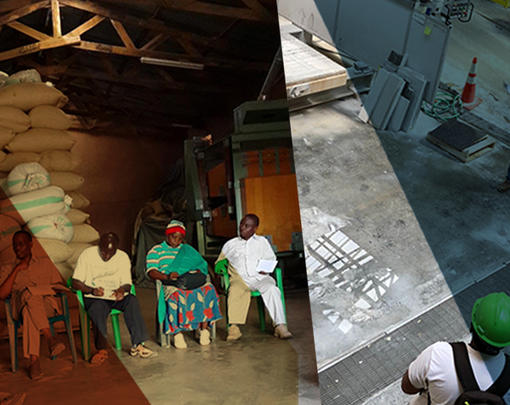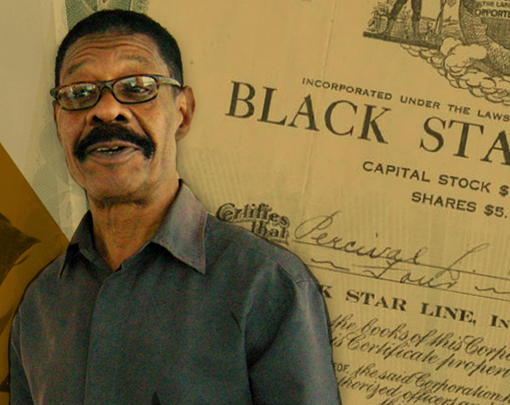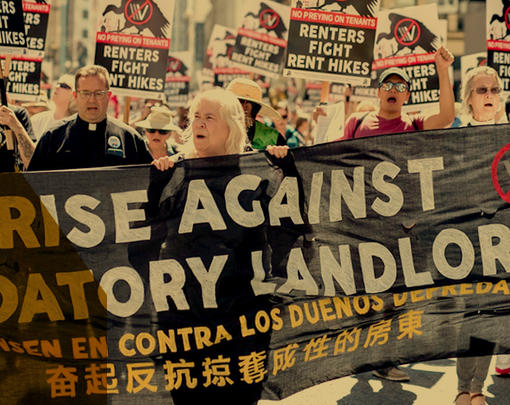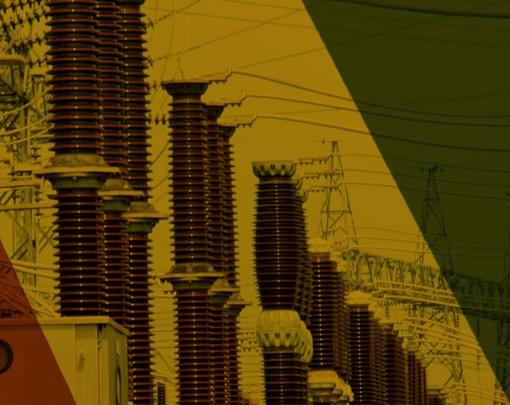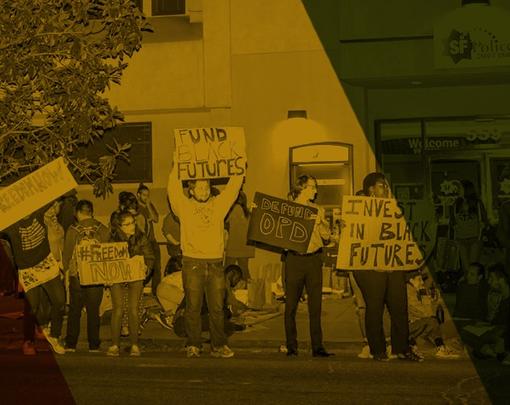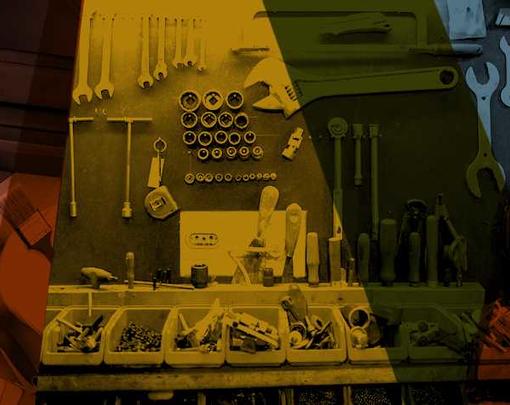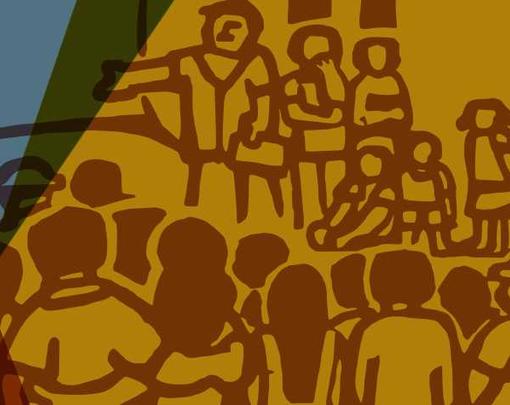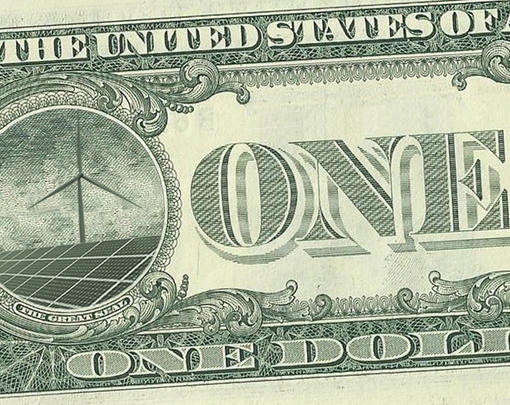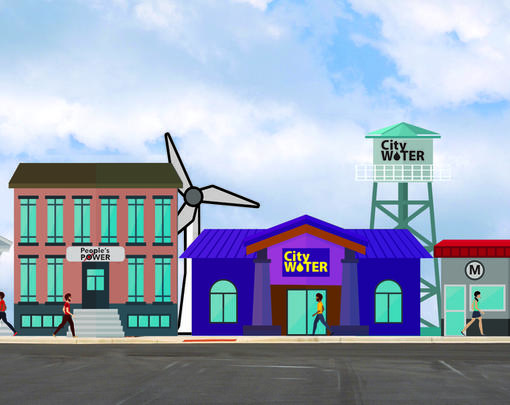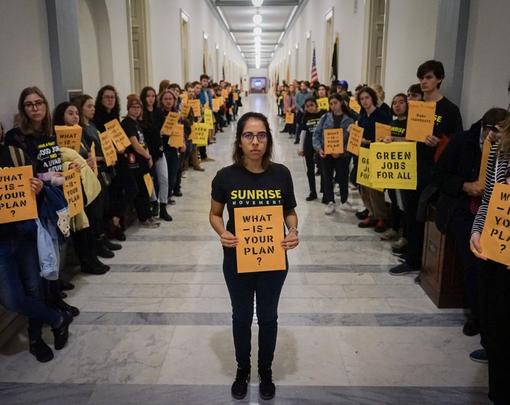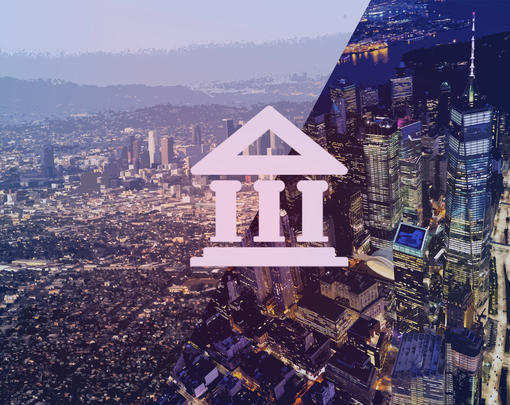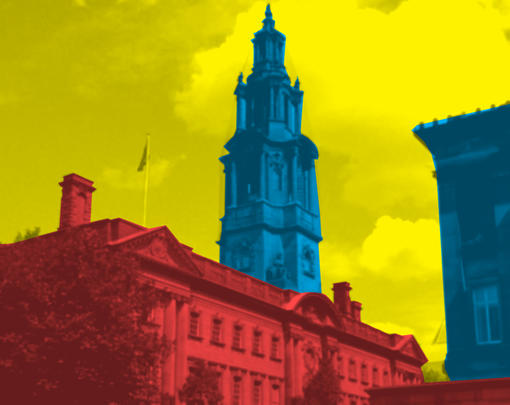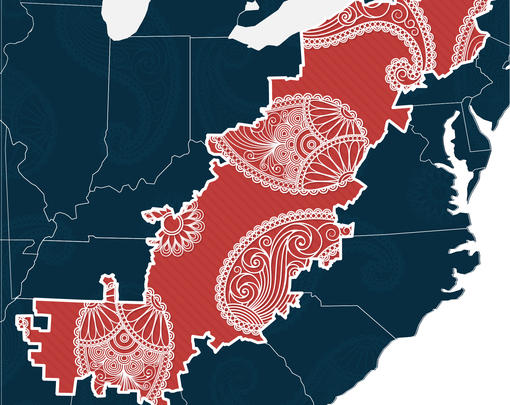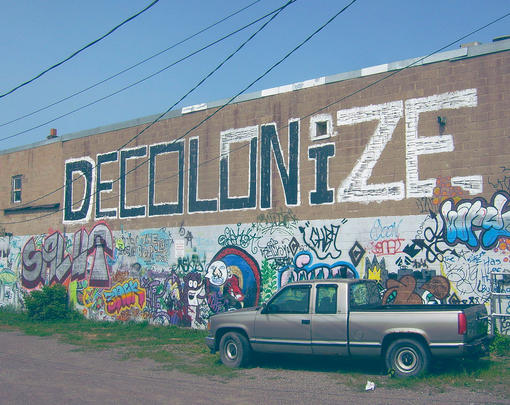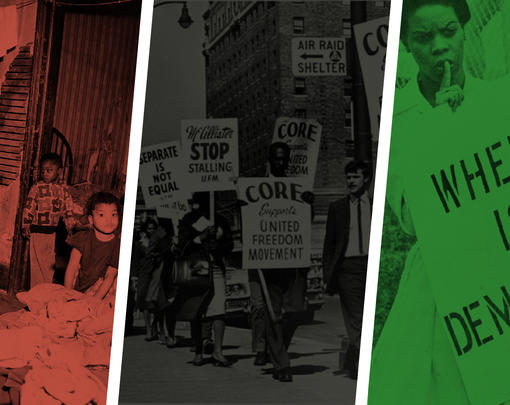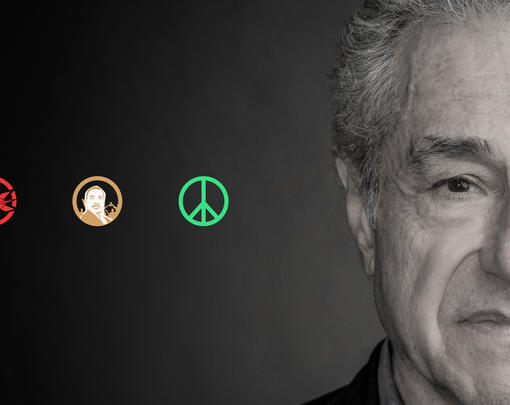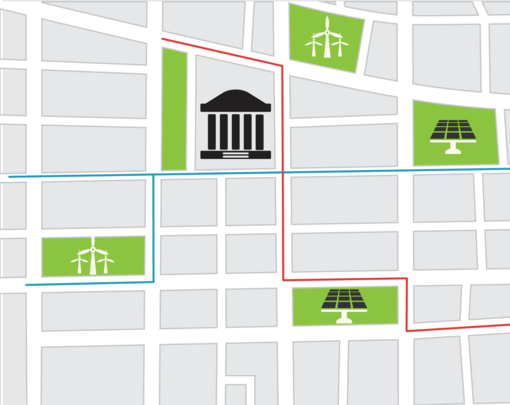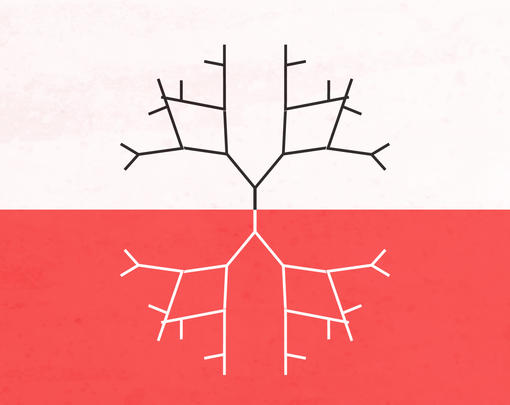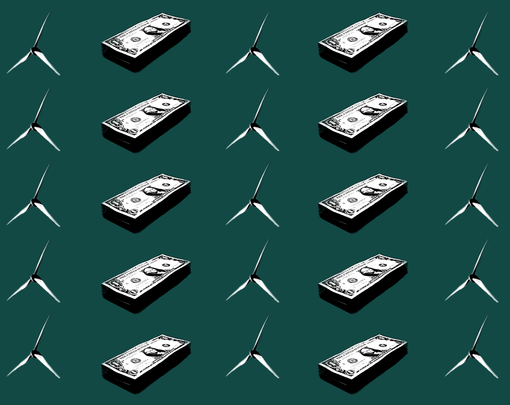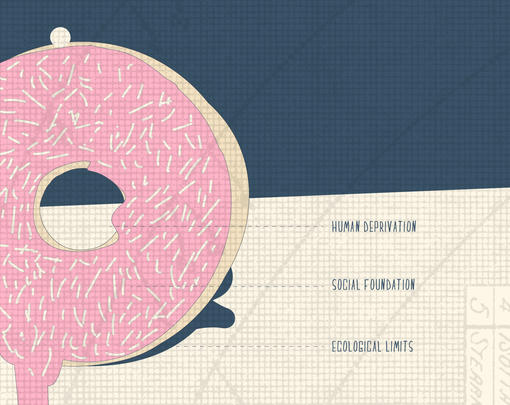This week on the Next System Podcast we’re joined by Carina Millstone to discuss how to design business for an economic system that is rooted within ecological limits. Millstone is the executive director of Feedback, and her book Frugal Value: Designing Business for a Crowded Planet confronts issues of ownership, scale, consumption, and the other issues society must confront on the path to a more sustainable economy.
The Next System Podcast is available on iTunes, Soundcloud, Google Play, and Stitcher Radio. You can also subscribe independently to our RSS feed here.
Adam Simpson: Welcome to The Next System Podcast. My name is Adam Simpson. Today our guest is Carina Millstone, the executive director of Feedback, a UK-based organization aiming to achieve a more regenerative food system. She is also the founder of the Orchard Project, a charity that has planted 400 community orchards in UK cities, and the author of Frugal Value: Designing Business for a Crowded Planet. Her book offers a compelling critique of mainstream conceptions of sustainable business and discusses alternatives to the all-too-often growth-obsessed, environmentally ambivalent firms that dominate our current economy.
Carina, welcome to the program.
Carina Millstone: Thank you.
Adam Simpson: Let’s dive right in. Carina, your book begins by examining a wide range of definitions for “sustainability” in the business world, which seems to mean something different there. But you make the argument that the oft-described business case for sustainability really doesn’t work most of the time, that commercial benefits only take us so far, and that really sustainability is less a business decision and more a moral decision. Could you say a little bit more about that?
Carina Millstone: Absolutely. I think the point is about, “What is sustainability at its core?” For me, sustainability at its core is about creating the environmental conditions on which human life can flourish now and in the future. This is perhaps my own definition, but there is, of course, a less controversial or widely accepted definition that we’ve had since the ’80s in the context of a report by the United Nations, the Brundtland Report. That talks about sustainability as creating the conditions for life now and meeting needs of the present without undermining the capacity of future generations to meet their own needs.
So what we have from the onset is a definition of sustainability that is about having a concern for needs today and a concern for needs tomorrow. So from the onset it’s a normative and moral position because it assumes that we think that we indeed have a responsibility to others and to the unborn. So if we start on that definition of sustainability making a moral claim on today’s actions for others and for future generations, then we immediately see that there’s absolutely zero reason why this would be in any way aligned with business motivation.
So when we talk about the business case for sustainability, what it says is that there is indeed a profit motive for considering actions now and for minimizing environmental impact. Now the truth is that that’s not necessarily the case. It’s very attractive as a notion to sell sustainability to business. It’s often positive. There’s definitely a business case. You can improve your reputation by embracing sustainability. You can save money. You can position your brand in an attractive way. But what we found is by and large that’s not necessarily true, and in fact for the overwhelming majority of today’s businesses what is profitable is unsustainable.
One of the reasons that it worries me so much that we keep on talking about this business case is that it implies that you should only adopt interventions for sustainability all for business; impact environmental minimization when there is indeed a business case, where there are profits to be achieved or cost savings to be reaped. But then, of course, what happens when it’s not the case? And then what? Do you throw sustainability initiatives out the window? So I worry a lot about selling sustainability to business on the basis of a business case.
Adam Simpson: Let’s put this into something more tangible. We’re talking about sustainability advocates being part of the problem when they speak this language of business, when they’re emphasizing reputational risk, brand positioning, and cost savings. Can you think of an example where you’ve seen this to be a problem, where the business case simply did not lead to more sustainable outcomes?
Carina Millstone: Yeah. I mean, who are these sustainable business professionals? We’re saying that by and large they work for big companies that have serious sustainability issues. Mother-and-son-type shops do not have a sustainability department, so there’s clearly a conflict there for organizations that are working for big business, and of course the business schools obviously. This notion of sustainable business is one that’s deeply embedded now across business schools, so again they have a vested interest selling courses to their students.
But in terms of examples where sustainability hasn’t paid, there are plenty of them. A very good example is Marks & Spencer’s. Marks & Spencer’s is one of the UK’s biggest supermarkets, but also retailers of clothes, and they’ve really put sustainability front and center in their brand positioning, in their communications, and indeed made real progress on sustainability in terms of their sourcing and so forth, to give them credit where it’s due. Well, has that paid off? The fact is, not really. What’s actually happening is that Marks & Spenser’s is unprofitable at the moment. Their profits have dropped significantly. So this is a very obvious example of where sustainability does not necessarily pay.
Adam Simpson: That leads me to think about the system that such businesses operate in. Part of your book focuses on the “root cause of our ecological mess,” that we need to put planet first and to see the economy as a subsystem of the environment. Is this the core nature of the moral shift we’re talking about?
Carina Millstone: Yes it is, but I would also add that this goes beyond a moral shift. I think this is more of a biophysical reality. We’ve tended to forget that all economic activity, all of society happens on planet Earth. This is really obvious, but we’ve nonetheless kind of forgotten about this. So the fact is, all the resources we can use come from what’s going on on the planet, and indeed all the wastes that we produce need to end up on planet Earth as well, be it in landfill, or be it in emissions, or effluence, and so forth. I think that shift is both a moral one, but also just bearing this in mind in terms of the structure of our society. So absolutely, we need an approach to business, an approach to economy that really recognizes this notion. There is no way to throw our wastes away, and there are no resources other than the solar energy that we have on this planet and what’s already here.
Adam Simpson: So when we’re talking about businesses in general as kind of primary drivers of overshooting our ecological limits, do you think that businesses can be a primary driver in a shift to a slow, circular economy? Is it possible that what you describe in your book as legacy businesses can step into leadership roles and push for a more rational definition of sustainability out of sheer self-interest?
Carina Millstone: This is a very good question. Just take a small step back: When I say that businesses are the core, root of our unsustainability, perhaps more accurately I think we need to diagnose the problem as economic growth. Economic growth inherently requires resource use, and we know that some resources are nonrenewable. There’s resource depletion. But also crucially, using said resources are damaging our climate, our biodiversity, and so forth. So the root problem is really economic growth.
The next question is, “What is the driver of economic growth?” And this is where I end up with big business, essentially. Why? We have an economy dominated by a handful or few thousand big corporations that are inherently structured to grow due to their ownership and financing structure. And I am indeed incredibly skeptical that these same companies that created this ecological overshoot are the appropriate actors to move us to better business models. The primary reason of this is, in my opinion, their ownership structure. That has some characteristics that make them incline or require them to externalize their cost to grow, to maximize their profit. So I am skeptical about the role of today’s big companies in driving shifts to our economy to make it more congruent with the reality that we are based on a finite planet, ultimately.
Adam Simpson: Regarding ownership, if we’re going to get to more moral decisions being made by business, I think we need to talk about redesigning ownership. You emphasized that sustainability advocates normally don’t address directly the question of ownership, so why do you think it is that in mainstream conversations about sustainability the question of ownership is left out?
Carina Millstone: I think we’ve ended up in a place where we view the business form, the investor-owned public limited liability company as the paradigmatic organization to deliver goods and services in our economy. We’ve grown up with this as a business form. This is a form that started in the 19th century, and I think we kind of treat it as a natural way of organizing our economy. Certainly most of our policymakers would not challenge this, that what we have are companies that are mainly owned by investors, that are the engines of growth, that are the engines of innovation and of the goods and services for our economy. I think we struggle to think past this in a way. You think about companies that have other ownership structures, they’re thought of as alternative ownership structures. You know, they’re the alternative rather than potentially what could be a dominant form of ownership. So I think we have a blind spot here. We’re just used to having these companies around.
In terms of sustainability advocates, as I say, many of them actually work for big business, so it would be a big step. For environmental campaigners, you might want to address these bigger pictures of ownership. I think they perhaps are rightly either too focused on more immediate victories, improving the sourcing of a product, or boycotting another product, or challenging on rainforest destruction, or whatever that might be. But I think now we’re at a time where we need to say loud and clear, “We cannot have an ecologically sustainable economy when we have an economy … when we have the publicly traded corporation as an economic actor,” and I think that’s quite a shift for environmental campaigner and sustainability advocates in our thinking about this.
Adam Simpson: So when we’re talking about ownership, I just want to ask, what is it about the traditional firm structure of one person being the owner or a group of people being the owner, other people working for them. What is it about that, that leads to ecological harm? Is there’s something peculiar about this model? And also you write about that ”pioneering companies,” as you put it, will be more worker-centered. And you even discuss worker ownership in your book. What about that model do you think would make it more sustainable than the traditional firm structure?
Carina Millstone: I think when we talk about ownership, I think we need to get to the bottom of what motivates owners to be in business. “What is the nature of the motivation?” I think for a lot of people who might be self-employed, that’s kind of a business form of sorts, the motivation might be pursuing a hobby, a talent, or service to a community. A small business likewise may enjoy being at the center of a community as a pharmacy or a restaurant, for example. And the motivation here is partly financial obviously, but there is no expectation of massive riches, and partly enjoyment, the pride in the everyday work, service to community, and so forth.
But then you see as owners become more and more remote from the everyday work of the firm, the motivation factor becomes increasingly financial because essentially they’re not doing the work. What happens then in the instance of a public corporation where the shares are traded on public markets very quickly is that the only motivation for shareholders to be in any way involved in the firm is the possibility of reaping high dividends in the next quarter. And this all of a sudden creates a firm where it creates the drivers to maximize cost externalization. That is to say, any social or environmental impacts will not be priced in products, but passed on to societies, and of course to grow, because the more the firm grows, the higher the profit.
Both these elements, this kind of cost externalization element and this growth element, are really inherently very problematic for the challenge of sustainability because what we want is actually products that are less impactful on communities and the environment, and what we want are businesses that don’t need to continually grow and continually push consumption. And that’s why I think this kind of big corporation that is investor-owned, where the owners are so distant from the firm, present so much trouble for the challenge of sustainability, which is one now ultimately of reduced resource use.
Adam Simpson: We’re emphasizing owners as being close to the production process. Is that a key reason why small firm structures are preferable, because it’s more likely that owners will be closer? Is that the problem with big business, with very, very large businesses, in your mind, or is there something else to firm size as well?
Carina Millstone: I think it’s perhaps not necessarily a question of a certain firm size is better for the environment. It’s more a question that certain types of ownership end up with smaller firm sizes that are likely to be better for the environment. So by this I mean worker-owned firms by and large remain small. And the reason for that is that there’s less of a driver to expand. You know, if you open another factory, all of a sudden you need 50 more workers, and the profits aren’t necessarily greater, so that motivation isn’t there. And moreover for the workers, they might well prioritize more enjoyable working conditions over growth. So I think this is a question of proximity to the work, the person actually doing the work and the person also being the owner, they’re one and the same person, I think is likely to lead to companies that exhibit characteristics that are more congruent with resource use reduction.
I’ll also say that part of the problem with the investor-owned model where investors are so distant from the firm, and when there are loads and loads of investors, potentially hundreds of thousands of owners in the instance of the large publicly traded corporations, is that there’s zero moral responsibility amongst the owners for the work of their firm, neither legal nor moral responsibility. And this is fundamentally a problem because, as we discussed earlier, taking action for sustainability is ultimately a moral positioning. It’s sort of a moral decision that cannot happen in a context in which owners feel no moral responsibility at all with regards to the conduct of the business.
Adam Simpson: I want to move to talk about the types of businesses that you advocate for, the pioneering companies. You talk about product stewards and product access companies, and I want to get to that, but first we need to talk a little bit about de-growth because it seems like such a massive cultural shift would be required for de-growth. It’s perhaps an old problem with system change. You’re trying to change the plane while it’s still in the air, as it were. How do you view the role of consumption in this dilemma because that seems like a key cultural point here within our current context that has to change to get to these models?
Carina Millstone: Yes, absolutely. And this is very complex, but if we diagnose the root cause of this ecological crisis as economic growth, we should be skeptical about wiggling our way out of it through further growth. Indeed it might well follow that de-growth, the process in which we move to an economy that uses fewer resources, that does not need to grow to function effectively, providing us all with a decent quality of life, is the way to go. Now, this is indeed a massive cultural shift. It’s a move away from consumerism, and it begs the question of, “What will make that shift possible?”
And here I must say I’m very skeptical of the kind of green consumer initiatives that often people talk about here because I do think that we will not be able to reduce consumption in a broader climate of increased production, which is what we see now where we have these big corporations that are intent on keeping us consuming and in fact require continued consumption for their profits.
So how do we go about that cultural shift? I think in the first instance it’s moving to business models that are inherently less resource-using than more traditional make-sell-break-type models in the first instance. And in the second instance, we will need to address the bigger question of, “What is it about a firm that may make it not require growth, essentially? What would make it operate on a steady scale?” And here I think again we will end up having to talk about ownership.
Adam Simpson: Now I do want to ask directly about the notion of product stewards and product access companies, the goods and services that a business that’s aiming to be a part of this economy-within-planet model. Can you talk a little bit about those models? What does that mean practically for a business?
Carina Millstone: Yes. This I think we need to take a slight step back to talk about efficiency and what I call sufficiency. This is because the answer of big corporations to the environmental problem, some of them who’ve taken action, is to make their products more efficient. And by this I mean they’ve reduced greenhouse gas emissions. They have maybe improved their sourcing. These all really, really great things. They’re minimizing the environmental impact of products, per capita each product is less impactful than it used to be. However, if the firm is still growing, what we end up with is overall still a growth in environmental impact, if the growth rate is bigger than the environmental efficiency rate per unit.
So here’s what we’re seeing. Some companies, even some livestock companies, that’s what they’ve done. They’re saying they’re going to reduce the environmental impact of meats, and then you look further down in the report and it turns out they’re going to grow twofold in the next 10 years, and you realize that overall their impact is going to grow. The reason I mention this is that we need to make a distinction between improving environmental efficiency per unit, efficiency, and reducing absolute environmental impacts overall, what I call sufficiency.
The reason I stress this is that since the goal is resource use reduction overall, the question that then came to my mind was, “Can we think of business models that align commercial success and sufficiency?” That is to say that if a firm’s successful, what it’s doing is it’s contributing to resource use reduction overall and not just on a unit basis. Here I identified what I think are two characteristics of artifacts of products that businesses have historically provided that would do just that: contribute to this resource use reduction overall. The first being shareability, the ability to be shared. So you have one product that is used by many different people, and clearly, you only need one product where you might have formally needed 25, which is great. And durability, that’s the process of reducing future objects over time. You know, over a 10-year period, you may have had 10 objects needing replacement. Now a more durable item, this may be just one over the same time period.
So the question then, “What are these business models that may enable durability and shareability?” And you’re right. I’ve come up with two product stewardship and product access models. Product stewardship is really what, in the sustainable world, would replace the traditional sales-based models that prevail in our current economy whereby producers would take responsibility, would actually have responsibility for their items throughout their life. Not just you sell it in a shop, and then the so-called consumer has it, then they dispose of it, then it’s waste. So this is a process.
What mechanisms would enable the producers to really take responsibility for their items for as long as possible while not creating the financial incentives that sales-based models do create where basically it’s more profitable to sell more? So these product stewards might explore options like leasing models, like product buybacks, reconditioning, repurposing, and so on. The product access models, these are really all these different mechanisms for sharing, renting, leasing, and so on as we’ve seen, for example, now with the whole car-sharing apps and others.
So these models aren’t kind of new. They’re my own terminology for what’s often thought of as the circular economy business models. But I think where I differ with the circular economy advocates is that I would argue that the big companies at the moment cannot deliver on these models without raising serious ethical considerations. And we see this, for example, on all the sharing apps, Airbnb, being obviously a case in point here, has raised all sorts of ethical issues around people already owning houses being in a position to cash in even more, with huge issues on the rental markets on housing and others. These kinds of issues could potentially be solved through innovation in ownership. Same for Uber-kind of apps and so forth, we have to question the added value of these being investor-owned firms when actually the service could equally be delivered with employee-owned drivers.
So I think once we’ve established the kind of business models that are conducive to reducing resource use, we then need to wonder, “What’s the nature of the organization best placed to deliver on these models? What does it look like? What kind of scale is it operating on, and who owns it, crucially.
Adam Simpson: A few questions about this model. One, competition is a key part of our economy now, so with more of these firms, would there be a role for competition? How would competition play out in such a context?
Carina Millstone: I would struggle to answer that question. To be entirely frank, I would see probably firms operating in a place-based way, so perhaps there’s less competition and as much as markets are geographically delineated, but I’m not sure. Competition is often spoken as a mechanism for innovation, but innovation in our current economy is understood as new products and services. Now, this is clearly in tension with what we know that we need, which is perhaps fewer products and services and reduced resource use. So I think we need to think a bit more broadly about the nature of innovation in this kind of sustainable ecological economy. It could be innovation on ownership. It could be innovation on the kind of relationships between customers and producers, or it could be innovation in terms of creating goods and services outside of the market economy. So I think we just need to try and imagine a world in which goods and services are not necessarily produced by profit-seeking, limited liability, investor-owned entities as it’s understood at the moment.
Adam Simpson: Talk to me a little bit about how a business would thrive in a broader context of de-growth because it seems like it’s such a key part of our current economy now, that service providers, the people that create goods, that there’s a reliance on expiration, planned obsolescence, on waste, on reproduction of new services. How in your mind does a business thrive in the context of de-growth? Because the notion, given the way most people think about mainstream economics, growth is so tied to our narrative, I think it might sound scary to people, the notion of de-growth, but how does a firm thrive in that environment?
Carina Millstone: Yes, this is a good question. I think we need to make a distinction in time, which is the situation we’re in now, a situation of an ecologically sound economy where people’s needs are met and so on, and the process by which we get to first to the second. Will we get to that endpoint of an ecologically sound economy? It remains to be seen. We could well experience collapse before that. But if we are going to go to that place, there is this transitional period. In that period, I think when we talk about de-growth, we need to clarify that it’s not de-growth across the board.
Clearly, there are some companies that need to grow in the shorter and in the medium term, in that transition phase. I’m thinking here about firms that could replace ecologically destructive alternatives. Clearly, we know there is no future for life on Earth while we have the fossil fuel companies, so there’s the energy transition that needs to happen, and here we will need to see new renewable energy companies and others. But I do think we need to be careful in terms of firms that are preferable now replacing alternatives versus growing the size of the pie altogether and increasing consumption overall, and this is my concern.
If we do eventually get to a point of sustainability, how do firms thrive in that context? Well, here I think we need to wonder what we mean by thriving ultimately, because what makes a successful business? Success is what the owner makes of it, right? So we get back to this notion of motivation. A thriving business could be one that just about breaks even, but that is enough for the business owner. So I think we need to think about thriving beyond financial riches, to generating enough profit to stay in business and to fulfill whatever other motivations of the owners to be in business in the first place.
Adam Simpson: What would say was the reaction from the business community to some of these ideas when you presented them in your book? Did you get any feedback? Did you see people taking very seriously the question of moral decision-making in business?
Carina Millstone: I think there is this notion that some business leaders have started to take this idea seriously. I have been to more events than I care to recall about responsible business and corporate sustainability, and this and that. But the reality is, of course, the examples and the people are always few and far between. If I hear the word Unilever again at these events, I will go mad. So the reality is there is this notion that for these big corporations, in the midst of the climate crisis, there has been this wake-up call that they can’t just do nothing.
Having said that, for a lot of them—all of them, in fact—it’s still addressing this efficiency piece I was mentioning earlier. That is to say, they’re thinking, “How can we use our current business model while trying to improve our sourcing, while trying to cut our emissions, while trying to reuse our waste, and so forth?” So the examples of moving past conventional sales-based business models are few and far between.
The second piece, obviously, ownership is never discussed in these fora. So, the idea is that Unilever, despite all its good work, may still be incompatible if it’s still seeking to grow, if it’s perhaps not conducive to the great challenges of security, and if some of its products are ultimately too resource-intensive for the good generated. Obviously, these kinds of discussions do not take place in these arenas at all.
And the reality, of course, that some companies will simply not exist in a sustainable world is not discussed. Nonetheless, we know that some of these companies, the fossil fuel industry—I would argue also big livestock—I just simply do not see a place for them in an ecologically sound world where human life is viable. This, of course, is not something that’s discussed within those companies.
Adam Simpson: It’s an interesting question because it gets back to the notion of consumption again. Recently with the IPCC report coming out that, you know, we have 12 years to make changes to our economy is essentially the thesis there, even less so. There was some poo-pooing going on about people who were saying, “If you want to have an impact, what you should do is you should change your light bulbs, and you should walk to work.” People were decrying the notion of individual action here. And while I’m sympathetic to that, it’s also true I think that, going back to the cultural shift, that our lives and our consumption habits will have to change, isn’t that correct?
Carina Millstone: Oh, absolutely. They’re going to have to change dramatically. Think about consumers. For a start, I am skeptical of the use of this word, citizens, but nonetheless, we need to really bear in mind that our consumption patterns are entirely shaped by the availability of what’s on markets. “What’s practical? What’s affordable within our budgets?” So I think that we need, of course, some behavior change, some changes in consumption. Will that drive the changes we need to our economy? No, it won’t. What it will do is provide some evidence base that people are willing to change, some legitimacy to advocacy efforts.
You mentioned the IPCC report. You’re right. What’s very clear is that the scale and the pace is so huge that this will require government intervention and will require changes in business practice, and these will come from politicizing these issues from civil society movements. We can’t expect the lone citizen to lead the way necessarily. The reality is we’re locked into a certain system of consumption whether we like it or not. If we want to participate fully in society, most of us need to use fossil fuels. We need to heat our homes. There are limits to what we can buy in terms of food. I think we shouldn’t overly rely on what individual behavior change can do. What’s more likely to lead to success is politicizing issues around consumption, around business practice, and asking for change from our legislators.
Again, meat is a very good example. A report came out just earlier this week. Apparently we need to reduce our meat consumption by 90 percent by 2050 in the UK, and I presume in the global north more generally, and there is absolutely no doubt that we cannot get to what is essentially a complete shift to plant-based diets in that time without government intervention, and without asking businesses to sell less meat, and without governments changing public procurement, and so on. The time for individual behavior and soft measures is over, and I think it’s incumbent on civil society groups to say that loud and clear now.
Adam Simpson: If we’re talking about worker-owned firms, if we’re talking about B corporations—about Unilever, a more traditional type of corporation that has been obtaining more sustainable brands under its umbrella, as it were—do you see these types of businesses becoming moral agents, like getting more into the space of moral decision-making given the current context? What I’m asking is, if we have a worker-owned cooperative, what’s to stop that worker-owned cooperative from having the same growth obsession, the same waste patterns given the current context that they will be operating in?
Carina Millstone: I think that’s a good question. I don’t think worker ownership necessarily leads to better business. A very good example obviously is the John Lewis Partnership, probably one of the largest worker-owned cooperatives in the world here in the UK. We have found that they perform the worst in terms of food waste prevention, and food waste is a massive climate change contributor, so absolutely. It’s not necessarily the case that worker ownership necessarily leads to firms that are preferable to firms with more investor-owned structures. However, worker ownership open the possibility, I think, for better decision-making, and it does this because workers are not necessarily bound to profit maximization.
Talking of Unilever, obviously they get a lot of good press for their work on sustainability. The fact is they have chosen to make sustainability really core to their brand, which is a good thing. At the same time, arguably, perhaps it’s crowding out other food producers to do the same thing because that market’s been cornered. Does this mean that we end up with less sustainable outcomes overall? I think that’s not impossible. But also what will happen when sustainability no longer pays, or when the leaders, Paul Polman, who has a personal interest in this, moves on? The fact is that due to its structure, the likes of Unilever are legally bound to operate in their shareholder’s interest. Any talk about balancing the needs of shareholders and other stakeholders, I’m skeptical of. We could consider them, but, nonetheless, these companies exist to maximize financial returns.
I think we need to make the distinctions as to what’s the underlying legal ownership structure of a company. For some companies, worker-owned companies—smaller businesses where workers are also owners—that possibility of not growing or of pursuing other motivations, so-called lifestyle businesses, is opened when it’s not for corporations.
Adam Simpson: My final question is really just my own personal fascination regarding workforce automation. Part of my work at the Democracy Collaborative and The Next System Project increasingly has to do with technological labor replacement or this notion that robots will take our jobs. And while the impact on workers is a very important discussion, very rarely do I see the environmental effects of these kinds of increased production getting a mention when people are talking about workforce automation given the role that our current forms of production play in ecological harm. So I was pleased to see that it got a mention in your book. I was wondering if you could say a few words about how you think about increasingly automated systems? Maybe it has something to do with proximity between worker and production? But if you could say a few words about how you conceive of how automation might affect the climate.
Carina Millstone: I think this is a very topical and difficult question. I spent a long time trying to get my head around this because I think automation is really kind of a double-edged sword for both the environment and for workers. On the one hand, automation for workers at least, yes, they could be stealing our jobs, right? That’s perhaps a scary prospect. On the other hand, automation has historically saved people from unpleasant, arduous work, obviously the kind of back-breaking work of manual agriculture before the Industrial Revolution, this kind of difficult work. There definitely is a case that automation in the right circumstances is good for workers.
There is also the argument from an environmental perspective that automation in the industrial society is what has sped up the pace of object production, and this is alarming. Arguably, we could say that automation, the industrial machine, is what’s created consumer society. And we know that consumer society is what is behind all this overuse of resources that we’re seeing.
Where does that leave us looking forward? I would say that we need to purposefully think about automation, so the needs of the workers are not being arranged around what kind of machines should their job support to maximize production and profit, which I think is the current situation, but can automation support good work? In which case, it’s a good thing. Can automation replace hard labor? In which case, it’s a good thing. If it is replacing hard labor, and if it is leading to the proliferation of goods, how do we counter this? Perhaps with a shorter working week. There is an increasing body of evidence that we ought to be working far less than we are, maybe 21 hours a week. Obviously, the five-day working week is a historical accident; It’s not a given. So maybe in this kind of sustainable world, we’re working on paid work three days a week? Three or four days a week.
And then I think it’s worth thinking that, again in this kind of ecological world, there are a lot of jobs that don’t exist today, a lot of roles that need to happen and many of them can’t be automated. I’m thinking here about care work. Unfortunately, I’m thinking about disaster relief. If some of the worst climate predictions come true, there will be that kind of work. There’s work for mass retrofitting of all our existing infrastructure. This could be millions of green jobs. And there could be all new work around ecosystem restoration and management.
I think this automation piece is a double-edged sword ultimately.
Adam Simpson: Carina, we covered a lot of ground. Is there anything left that maybe we didn’t cover that you’d like to emphasize to our listeners before we conclude?
Carina Millstone: Your last question, the kind of reception that the book’s been getting, I will say muted. I think the people who’ve been interested in my book have been primarily new economy advocates, people who are interested and people who know it in their body that they don’t like the corporation, they don’t like big business, but perhaps have struggled to get to the bottom of what is so problematic about these firms from an environmental perspective. I think my book’s been well received by those kinds of activists. For most business leaders, I will say that it’s perhaps a step too far for their thinking at the moment.
Adam Simpson: Well, that’s unfortunate, but I hope we can change those perceptions.
Carina Millstone: I hope so, too.
Adam Simpson: Carina, it was a pleasure talking with you, and I really look forward to sharing this with our listeners.
Once again, we were talking today with Carina Millstone, executive director of Feedback, a founder of The Orchard Project, and author of Frugal Value: Designing Business for a Crowded Planet. Carina, thanks so much again.
Carina Millstone: Thank you so much.
Adam Simpson: For our listeners, we’ll see you next time on The Next System Podcast.



